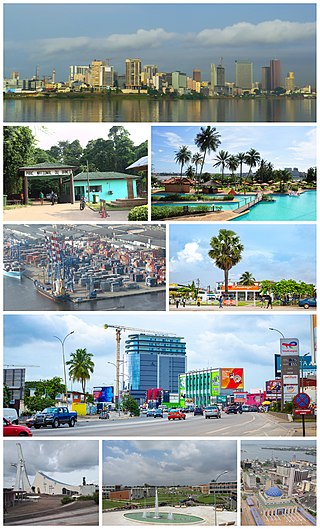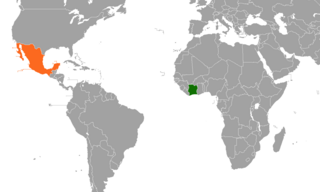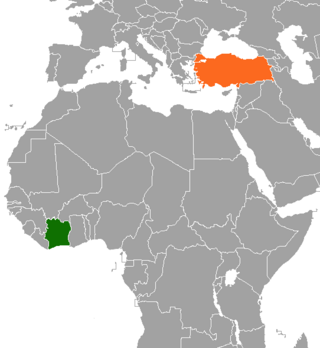 | |
United States | Ivory Coast |
|---|---|
Ivory Coast is one of the most pro-United States nations in Africa and the world, with 85% viewing the U.S. favorably in 2002, and rising to a high of 88% in 2007. [1]
 | |
United States | Ivory Coast |
|---|---|
Ivory Coast is one of the most pro-United States nations in Africa and the world, with 85% viewing the U.S. favorably in 2002, and rising to a high of 88% in 2007. [1]

In 1842, the U.S. Navy launched the Ivory Coast expedition, a punitive expedition carried out in response to attacks on U.S. merchant ships by the native Bereby people, residing in what would become the modern-day country of Ivory Coast. [ citation needed ]
As of the late 1980s, Ivory Coast's relationship with the U.S. was cordial, if less intimate than its ties with its former colonizer France. [2] Through the mid-1980s, Ivory Coast was one of Africa's most loyal supporter of the United States in the United Nations General Assembly. [2] It supported the larger United States agenda on Chad, the Western Sahara, southern Africa, and Israel. [2] The government strongly approved of moves by the United States against Muammar al-Gaddafi, especially in light of rumors that Libyans in Burkina Faso were recruiting and training agents to infiltrate Ivory Coast. [2] United States Secretary of State George P. Shultz visited Abidjan in 1986 following Félix Houphouët-Boigny's visit to Washington, D.C. in 1983. [2]
The United States continued to be Ivory Coast's leading trading partner, after France. [2] During the Cold War, foreign policymakers in Washington continued to point to Ivory Coast as an exemplar of successful capitalism, even as Ivory Coast's foreign debt mounted out of control. [2] While enjoying a favorable image in the United States, Houphouët-Boigny has indirectly criticized the United States by attacking the system of international trade, which the United States supported unequivocally, but which Houphouët-Boigny claimed was responsible for his country's economic ills. [2]
Some strain has resulted from the Section 508 restrictions on nonhumanitarian aid imposed on Ivory Coast following the December 1999 coup. Because of Ivorian governmental interference in the 2000 presidential elections, the Section 508 restrictions were not lifted. The U.S. participates in the international effort to assist Ivory Coast in overcoming its current crisis, providing more than a quarter of the funding for the UN peacekeeping mission that helps to maintain the ceasefire. The U.S. has also provided modest economic support fund (ESF) assistance to promote democracy. The U.S. is sympathetic to Ivory Coast's desire for rapid, orderly economic development as well as its moderate stance on international issues. Bilateral U.S. Agency for International Development funding, with the exception of self-help and democracy and human rights funds, has been phased out, although Ivory Coast continues to benefit to a limited extent from regional West African programs. The country remains a major beneficiary of U.S. assistance in combating HIV/AIDS, as it is one of 15 focus countries under the President's Emergency Plan for AIDS Relief (PEPFAR). With assistance under PEPFAR likely to total some $85 million in FY 2007 (equivalent to $108,610,000in 2021), this is by far the largest U.S. assistance program in Ivory Coast. Ivorian eligibility for the African Growth and Opportunity Act (AGOA) has been withdrawn, following the political impasse resulting from the 2002 rebellion. The U.S. and Ivory Coast maintain an active cultural exchange program, through which prominent Ivorian Government officials, media representatives, educators, and scholars visit the U.S. to become better acquainted with the American people and to exchange ideas and views with their American colleagues. This cooperative effort is furthered through frequent visits to Ivory Coast by representatives of U.S. business and educational institutions, and by visits of Fulbright-Hays scholars and specialists in various fields. A new U.S. Embassy chancery compound opened in July 2005. A modest security assistance program that provides professional training for Ivorian military officers in the U.S. has been suspended by the Section 508 restrictions.
While Yamoussoukro is the political capital of Ivory Coast, the U.S. Embassy is located in the economic capital of the country, in the Riveria Golf neighborhood of Cocody, Abidjan.
The United States Department of State uses the name Republic of Côte d'Ivoire when referring to Ivory Coast in international settings and diplomatic matters. They also use the francophone demonym "Ivoirian" in official communications. [3]
| Embassy of Ivory Coast, Washington, D.C. | |
|---|---|
 | |
| Location | Washington, D.C. |
| Address | 2424 Massachusetts Avenue, N.W. |
| Coordinates | 38°54′49″N77°3′12″W / 38.91361°N 77.05333°W |
| Ambassador | Yao Charles Koffi |
The Embassy of Ivory Coast in Washington, D.C. is the diplomatic mission of the Republic of Ivory Coast to the United States. It is located in the Embassy Row neighborhood. [4]
The Ambassador is Yao Charles Koffi. [3]
Human arrival in Ivory Coast has been dated to the Upper Paleolithic period, or at the minimum, the Neolithic period based on weapon and tool fragments, specifically polished shale axes and remnants of cooking and fishing. The earliest known inhabitants of Côte d'Ivoire left traces scattered throughout the territory. Historians believe these people were all either displaced or absorbed by the ancestors of the present inhabitants. Peoples who arrived before the 16th century include the Ehotilé (Aboisso), Kotrowou (Fresco), Zéhiri, Ega, and Diès (Divo).

Ivory Coast, officially the Republic of Côte d'Ivoire, also known as Côte d'Ivoire, is a country on the southern coast of West Africa. Its capital is Yamoussoukro, in the centre of the country, while its largest city and economic centre is the port city of Abidjan. It borders Guinea to the northwest, Liberia to the west, Mali to the northwest, Burkina Faso to the northeast, Ghana to the east, and the Gulf of Guinea to the south. Its official language is French, and indigenous languages are also widely used, including Bété, Baoulé, Dioula, Dan, Anyin, and Cebaara Senufo. In total, there are around 78 different languages spoken in Ivory Coast. The country has a religiously diverse population, including numerous followers of Islam, Christianity, and traditional faiths like Animism.

Koudou Laurent Gbagbo is an Ivorian politician who was the president of Côte d'Ivoire from 2000 until his arrest in April 2011. A historian, Gbagbo was imprisoned in the early 1970s and again in the early 1990s, and he lived in exile in France during much of the 1980s as a result of his union activism. Gbagbo founded the Ivorian Popular Front (FPI) in 1982 and ran unsuccessfully for president against Félix Houphouët-Boigny at the start of multi-party politics in 1990. He won a seat in the National Assembly of Côte d'Ivoire in 1990.

The Democratic Party of Ivory Coast – African Democratic Rally is a centre-right political party in Ivory Coast.

Félix Houphouët-Boigny, affectionately called Papa Houphouët or Le Vieux, was an Ivorian politician and physician who served as the first president of Ivory Coast, serving from 1960 until his death in 1993. A tribal chief, he worked as a medical aide, union leader, and planter before being elected to the French Parliament. He served in several ministerial positions within the French government before leading Ivory Coast following independence in 1960. Throughout his life, he played a significant role in politics and the decolonisation of Africa.
The First Ivorian Civil War was a civil conflict in the Ivory Coast that began with a military rebellion on 19 September 2002 and ended with a peace agreement on 4 March 2007. The conflict pitted the government of Ivorian President Laurent Gbagbo against a domestic insurgency led by the New Forces of Ivory Coast. Following the war, a second civil war (2010–2011) would begin over the results of the 2010 Ivorian presidential election.

Alasane Dramane Ouattara is an Ivorian politician who has been President of Ivory Coast since 2010. An economist by profession, Ouattara worked for the International Monetary Fund (IMF) and the Central Bank of West African States, and he was the Prime Minister of Côte d'Ivoire from November 1990 to December 1993, appointed to that post by President Félix Houphouët-Boigny. Ouattara became the President of the Rally of the Republicans (RDR), an Ivorian political party, in 1999.

Throughout the Cold War, Ivory Coast's foreign policy was generally favorable toward the West. In particular, Félix Houphouët-Boigny kept relations with France that was among the closest between any African country and a former colonial power. The country became a member of the United Nations at independence in 1960 and participates in most of its specialized agencies. It is also an associate member of the European Union. In general, President Bédié initiated and maintained relations with many countries of the European Union and Asia. Ivory Coast maintains a wide variety of diplomatic contacts.

Women in Ivory Coast formed less than half the country's population in 2003. Their social roles and opportunities have changed since the time of French colonialism.

The 1999 Ivorian coup d'état took place on 24 December 1999. It was the first coup d'état since the independence of Ivory Coast and led to the President Henri Konan Bédié being deposed.

Abidjan is the largest city and the economic capital of the Ivory Coast. As of the 2021 census, Abidjan's population was 6.3 million, which is 21.5 percent of overall population of the country, making it the sixth most populous city proper in Africa, after Lagos, Cairo, Kinshasa, Dar es Salaam, and Johannesburg. A cultural crossroads of West Africa, Abidjan is characterised by a high level of industrialisation and urbanisation. It is also the most populous French-speaking city in Africa.

Félix-Houphouët-Boigny International Airport, also known as Port Bouët Airport, is located 16 km south east of Abidjan, Ivory Coast. It is the largest airport in the country for air traffic. The airport is the main hub of the national airline Air Côte d'Ivoire. Named after the first president of Ivory Coast, Félix Houphouët-Boigny, this international airport is directly connected currently to airports in Europe and to many destinations within the rest of Africa and the Middle East. The airport is served by 17 airlines, covering more than 30 destinations.
Innocent Kobena Anaky is an Ivorian politician and the President of the Movement of the Forces of the Future (MFA), an opposition party. He served in the government of Côte d'Ivoire as Minister of State for Transport from 2003 to 2006.

Côte d'Ivoire–Soviet relations were the bilateral relations between Côte d'Ivoire and Soviet Union. Overall, the Ivorian-Soviet relations were sporadic and frosty as the Ivorian president Félix Houphouët-Boigny mistrusted the Soviet Union and had a negative view of the Soviet role in Africa.

On December 4, 1958, Ivory Coast became a member state within the French Community. On August 7, 1960, Ivory Coast achieved its full independence from France, and Félix Houphouët-Boigny became the first president after the independence.

Ivory Coast–Mexico relations are the diplomatic relations between Ivory Coast and Mexico. Both nations are members of the United Nations.

Canada–Ivory Coast relations are the diplomatic relations between Canada and Ivory Coast. Both nations are members of the Organisation internationale de la Francophonie.

Ivory Coast–Turkey relations are the foreign relations between Ivory Coast and Turkey.

France–Ivory Coast relations are the diplomatic relations between the French Republic and the Republic of Ivory Coast. Both nations are members of the Organisation internationale de la Francophonie and the United Nations.
The embassy of the United States in Abidjan is the diplomatic mission of the United States of America in Ivory Coast. While Yamoussoukro is the political capital of Ivory Coast, the U.S. Embassy is located in the economic capital of the country, in the Riveria Golf neighborhood of Cocody, Abidjan.
{{cite encyclopedia}}: CS1 maint: postscript (link)![]() This article incorporates public domain material from U.S. Bilateral Relations Fact Sheets. United States Department of State.
This article incorporates public domain material from U.S. Bilateral Relations Fact Sheets. United States Department of State.